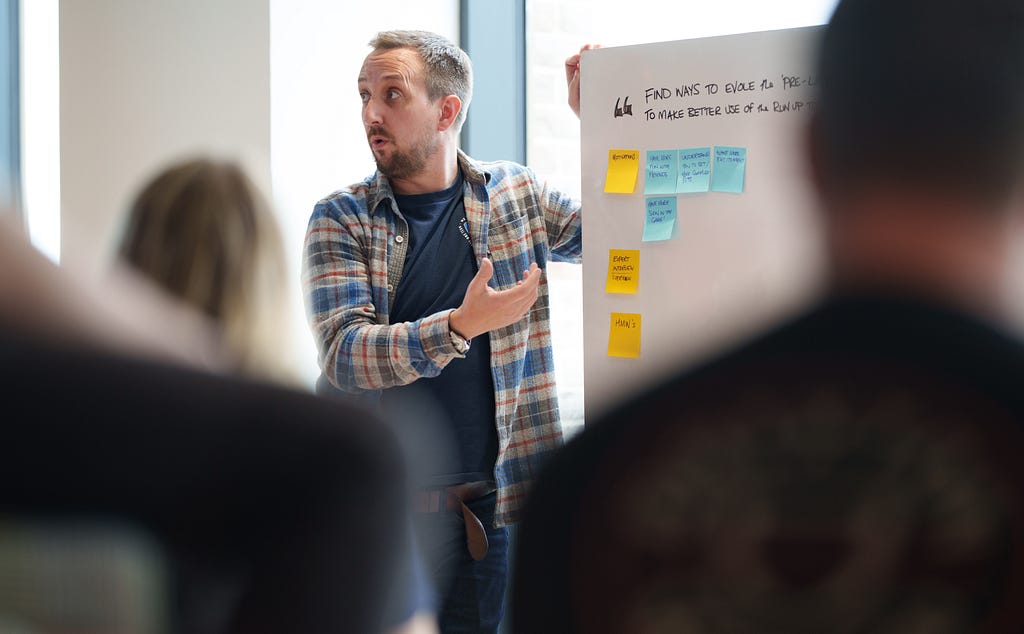The impact of having a collaborative approach at FanDuel
Written by Leanne McKenzie, Senior Service Manager

Teamwork makes the dream work.
We’ve all heard it a million times — enough times that the last drops of irony have well and truly been wrung from the cliché.
And yet we’re stuck with it because the statement ultimately remains true — human collaboration is undoubtedly the key to our success. The development of our agriculture processes, the construction of our cities, the discussion of whose turn it is to take out the bins…it’s not a one-person show, and it never will be.
But what does collaboration look like to us here at FanDuel? How do we live this idea of teamwork and success through collaboration, and how can you take our learnings and use them yourself?
Let’s take me and my experience as a test case.
During my three-year tenure at FanDuel, I have had the privilege of collaborating with many talented people across a range of teams. Within that time, I have held four different positions across the company (including my current), and I credit a major part of my success to learning how to effectively communicate and work alongside others, listening to their ideas and feedback, and sharing my own when called for.
Take my current role, Senior Service Manager. A significant part of my job revolves around ensuring that if any issues or incidents ever do occur, they are smoothly resolved within a timely manner. This includes strategy work and conducting product test runs with a group of our engineers based around the globe.
These test runs are vital to day-to-day operations as they allow us to plan for the worst-case scenario in real-time, allowing teams across the company to utilise the data and collaborate to solve any potential snags and issues.
In a position like mine where there is very little structure in your day-to-day, and you’re very much reacting and firefighting, you are reliant on strong communication across various key team areas.
Being efficient in your job is great, but to avoid stretching yourself too thin and risk falling behind, you need a strong team to work alongside, one that you know well personally, and one that you also understand professionally — how they work, their idiosyncrasies and individual strengths, but also what they’re like as a unit working in tandem.
For those looking to improve their collaboration skills, I would offer my top three pieces of advice that I’ve found essential:
1. Make time for everyone to be in the same place to maximise output and liaison:
This is something you’ll have to learn to deal with in changing circumstances. For example, while it would be great to have your whole team in the same room where you can speak to them face to face, in a global company like FanDuel, that’s not always possible. The use of digital tools such as Miro and other virtual whiteboards has been indispensable to me in my role.
Regardless of how the brief is communicated, it is essential that the team has that initial (and subsequent) opportunity to come together and discuss the task, as well as see how other members are getting on.
2. Take time to really set the scene for each project and team so all understand the overall goal:
Our key resource at FanDuel is our people, and we recognise that each person brings something unique to the team, which is why it is important to hear from everyone. When a team is able to come together, armed with exact briefs and all their questions answered, the results speak for themselves.
But how do I get my team to that place? This is where storytelling comes in.
This is a big one. Being able to clearly outline objectives, who does what, and what is expected of the team as a whole, is a must. If you expect a well-oiled machine that produces what you are looking for on time, then it is on you to ensure they are fully briefed and supported from beginning to end. Your ability to communicate your team’s objectives, clearly yes, but in an interesting or inspiring way, is key. Set the scene — what is our goal here, what are we aiming to achieve? Your team should know this from the outset.
3. Always have clear docs and messaging:
Sounds self-explanatory enough, but definitely worth the characters to emphasise. For all documents and messaging, the exact objectives, timeframe, and allocation of tasks is priceless, like a great big diamond.
And just like a diamond, clarity is key — keep all docs and messaging as simple and straightforward as possible, top-line and fundamental. Wordplay and creativity are great, but let’s keep them to the blog posts, shall we?
It’s also worth checking accessibility — ensure all members of your team can access these materials and follow up with any questions that they do have.
You can learn more about our team and methodologies here: https://www.fanduel.co.uk/
The impact of having a collaborative approach at FanDuel was originally published in FanDuel Life on Medium, where people are continuing the conversation by highlighting and responding to this story.